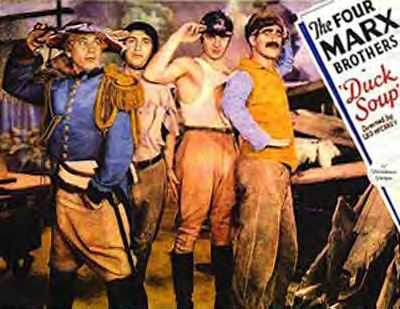 Oliver Morrison over at The Atlantic has a tremendous article that ponders the comedic divide that spans our political landscape. Why, he asks, do most political satirists identify with left-of-center thought? And, why are the majority of radio talk show hosts right-wing? Why is there no right-wing Stephen Colbert, and why no leftie Rush? These are very interesting questions.
Oliver Morrison over at The Atlantic has a tremendous article that ponders the comedic divide that spans our political landscape. Why, he asks, do most political satirists identify with left-of-center thought? And, why are the majority of radio talk show hosts right-wing? Why is there no right-wing Stephen Colbert, and why no leftie Rush? These are very interesting questions.
You’ll find some surprising answers, which go beyond the Liberal stereotype of the humorless Republican with no grasp of satire or irony.
From the Atlantic:
Soon after Jon Stewart arrived at The Daily Show in 1999, the world around him began to change. First, George W. Bush moved into the White House. Then came 9/11, and YouTube, and the advent of viral videos. Over the years, Stewart and his cohort mastered the very difficult task of sorting through all the news quickly and turning it around into biting, relevant satire that worked both for television and the Internet.
Now, as Stewart prepares to leave the show, the brand of comedy he helped invent is stronger than ever. Stephen Colbert is getting ready to bring his deadpan smirk to The Late Show. Bill Maher is continuing to provoke pundits and politicians with his blunt punch lines. John Oliver’s Last Week Tonight is about to celebrate the end of a wildly popular first year. Stewart has yet to announce his post-Daily Show plans, but even if he retires, the genre seems more than capable of carrying on without him.
Stewart, Colbert, Maher, Oliver and co. belong to a type of late-night satire that’s typically characterized as liberal, skewering Republicans (and, less frequently, Democrats) for absurd statements or pompousness or flagrant hypocrisy. “The Daily Show, The Colbert Report, Funny Or Die, and The Onion, while not partisan organs, all clearly have a left-of-center orientation,” wrote Jonathan Chait in The New Republic in 2011.This categorization, though, begs the question of why the form has no equal on the other side of the ideological spectrum. Some self-identified conservative comics argue that the biased liberal media hasn’t given them a chance to thrive. Others point out that Obama is a more difficult target than his Republican predecessor: He was the first African-American president, which meant comedians have had to tip-toe around anything with racial connotations, and his restrained personality has made him difficult to parody.
But six years in, Obama’s party has been thoroughly trounced in the midterms and publicly excoriated by right-wing politicians, yet there’s a dearth of conservative satirists taking aim, even though the niche-targeted structure of cable media today should make it relatively easy for them to find an audience. After all, it would have been difficult for Stewart or Colbert to find an audience during the era when three broadcast stations competed for the entire country and couldn’t afford to alienate too many viewers. But cable TV news programs need only find a niche viewership. Why then, hasn’t a conservative Daily Show found its own place on Fox?
Liberal satirists are certainly having no trouble making light of liberal institutions and societies. Portlandia is about to enter its fifth season skewering the kinds of liberals who don’t understand that eco-terrorismand militant feminism may not be as politically effective as they think. Jon Stewart has had success poking fun at Obama’s policies. And Alison Dagnes, a professor of political science at Shippensburg University, has found that the liberal Clinton was the butt of more jokes on late-night shows of the 1990s than either George W. Bush or Obama would later be.
So if liberals are such vulnerable targets for humor, why do relatively few conservative comedians seem to be taking aim at them?
ne explanation is simply that proportionately fewer people with broadly conservative sensibilities choose to become comedians. Just as liberals dominate academia, journalism, and other writing professions, there are nearly three times as many liberal- as conservative-minded people in the creative arts according to a recent study. Alison Dagnes, a professor of political science at Shippensburg University, argues that the same personality traits that shape political preferences also guide the choice of professions. These tendencies just get more pronounced in the case of comedy, which usually requires years of irregular income, late hours, and travel, as well as a certain tolerance for crudeness and heckling.
There are, of course, high-profile conservative comedians in America, such as the members of the Blue Collar Comedy Tour. But these performers, who include Jeff Foxworthy and Larry the Cable Guy, tend carefully to avoid politicized topics, mocking so-called “rednecks” in the same spirit as Borscht Belt acts mocked Jewish culture.
When it comes to actual political satire, one of the most well-known figures nationally is Dennis Miller, a former Saturday Night Live cast member who now has a weekly segment on Fox News’ O’Reilly Factor. On a recent show, O’Reilly brought up the Democrats’ election losses, and Miller took the bait. “I think liberalism is like a nude beach,” Miller said. “It’s better off in your mind than actually going there.” His jokes are sometimes amusing, but they tend to be grounded in vague ideologies, not the attentive criticism to the news of the day that has given liberal satires plenty of fodder five days a week. The real problem, Frank Rich wrote about Miller, “is that his tone has become preachy. He too often seems a pundit first and a comic second.”
The Flipside, a more recent attempt at conservative satire, was launched this year by Kfir Alfia, who got his start in political performance a decade ago when he joined the Protest Warriors, a conservative group that counter-demonstrated at anti-war protests. The Flipside started airing this fall in more than 200 stations across the country, but its growth is hampered by its small budget, according to The Flipside’s producer, Rodney Lee Connover, who said he has to work 10 times as hard because his show has 10 times fewer resources than the liberal shows supported by cable networks.
Connover was a writer along with Miller on The 1/2 Hour News Hour, the first major attempt to create a conservative counterpart to The Daily Showin 2007. It was cancelled after just 13 episodes and has remained the worst-rated show of all time on Metacritic. It was widely panned by critics who complained that it was trying to be political first and funny second, so the jokes were unsurprising and flat.
The host of The Flipside, Michael Loftus, says he’s doing the same thing as Jon Stewart, just with some conservative window-dressing. Wearing jeans, Loftus stands and delivers his jokes on a set that looks like the set of Tool Time, the fictional home-improvement show Tim Allen hosts on the sitcom Home Improvement: The walls are decorated with a dartboard, a “Men at Work” sign, and various other items the producers might expect to find in a typical American garage. In a recent episode, after Republicans won the Senate, Loftus sang the song, “Looks like we made it …” to celebrate the victory.
But rather than talking about the news, as Colbert and Stewart do, or deconstructing a big political issue, as Oliver does, Loftus frequently makes dated references without offering new context to freshen them up. “What’s the deal with Harry Reid?” he asked in a recent episode. “You either hate him or you hate him, am I right? The man is in the business of telling people how greedy they are, and how they don’t pay their fair share, and he lives in the Ritz Carlton … This guy is literally Mr. Burns from The Simpsons.” Much of his material seems designed to resonate with only the most ardent Fox News viewers. Loftus obviously can’t yet attract the kinds of celebrity guests his network competitors can. But instead of playing games with the guests he can get, he asks softball questions that simply allow them to spout off.
Greg Gutfeld, the host of Fox’s Red Eye, can also be funny, but his willing-to-be-controversial style often comes across as more hackneyed than insightful. “You know you’re getting close to the truth when someone is calling you a racist,” he once said. Gutfeld has also railed against “greenie” leftists who shop at Whole Foods, tolerance, and football players who are openly gay. Gutfeld’s shtick works okay during its 3 a.m. timeslot, but a recent controversy over sexist jokes about a female fighter pilot highlighted just how far his humor is from working in prime time.
So if conservatives have yet to produce their own Jon Stewart, it could be the relatively small number of working conservative comedians, or their lack of power in the entertainment industry. Or it could be that shows like The Flipside are failing at least, in part, because they’re just not that funny. But what is it about political satire that makes it so hard for conservatives to get it right?
Read the entire article here.
Image: Stephen Colbert at the 2014 MontClair Film Festival. Courtesy of the 2014 MontClair Film Festival.





